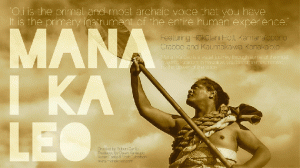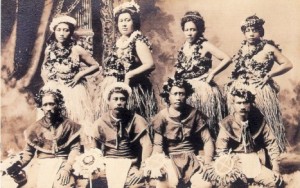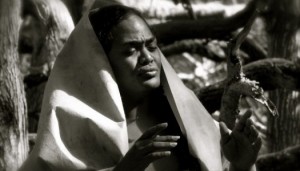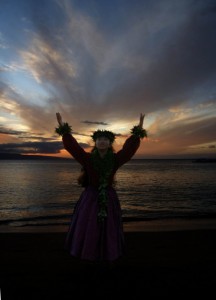Ancient Sonic Secrets of Hawaiian Power
The secrets of Hawaiian sacred chanting have been as shrouded as the mysteries that rest beneath the Vatican.
At last the history and oral tradition of Hawaii’s ancient royal lineages and the secrets long held by kahunas have been brought to light in an enveloping new short film called “Mana I Ka Leo – Power of the Voice.”
On January 16th, the film will screen at the MACC’s McCoy Studio Theater as a part of the Heritage Series.
It follows the personal journeys of three practitioners of the ancient art of Hawaiian Oli chanting, and their quest to keep the voices and words of their ancestor’s oral tradition alive.
The movie presents a sweeping landscape of the most beautiful sights in Hawaii, backed by the chants that were created by her ancient ancestors to tap into the power of the land and her people.
The ancient Hawaiian people kept no written records. Their written language was limited to petroglyphs. Yet with such limitations, they still functioned in an extremely hierarchical system of power, primarily based on genealogy.
A person’s connection to royal blood could only be proven by meticulous knowledge of their family tree, dating hundreds of years prior. The names of the ancestors in a lineage were thought to hold immense power for those who knew to call upon them.
In order to keep track of this vital knowledge, all names and had to be memorized and passed on. A system of verses was developed.
It became an art form known as the “Oli” chants. Within them was buried a record of the history of the land, and the lineage of the aristocracy.
Because ranking in Hawaiian society was based on bloodlines, the chants were important to link an individual to their powerful ancestors. The political, social, and economic system of Hawaii was based around the Oli.
As the culture became dominated by invasive Westerners, the Hawaiian chants disappeared underground, and the power hidden within the words became a more and more closely guarded secret.
Why the emphasis on the spoken word and the power of sound and word?
In ancient Hawaiian, words and names held power. Although this is still the case, this knowledge is guarded.
Each name in a genealogy chant carried the mana (power) of the ancestor. All names were linked by birth lines. The longer this link of names in the chant, the more mana was available to help lift the chanter towards their goals.
In the Oli chants, as with all Hawaiian language, there were layers of complex symbolism and metaphor, acting as a veil of double meaning to guard the untrained listener from ascertaining the true power of the words being spoken. The listener was given the task of translating the words, and interpreting their meaning.
In this way, only initiated trained by Kahunas could go deeply in to the center of the phrases, and accumulate the power hidden within. The film will examine the lives of three modern day Oli practitioners, and discover how the chants play into their lives, families, and relationships to God.
The power of language, as it is honored and revered by the Hawaiians, is a fascinating subject for every individual, on a quest to control the power of their own spoken words.
By attending the movie, you can explore the history and the sounds of these ancient chants as you take a stunning visual tour of the islands. You can also join the film’s co-writer and producer, Dawn Kani‘aupi‘o, and director, Ruben Carrillo, for a Q&A session following the screening.
Tickets are $10 at the box office.
The film shows at at 3 pm on Sunday, January 16th. To see the trailer, visit the movie’s website.
Go to www.mauiarts.org for more details.














